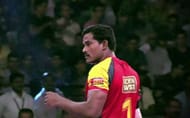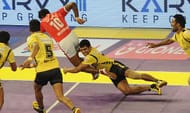India’s domination in the indigenous contact sport of kabaddi has been unmatched. When players from the country take on the mat in any international competition, they are sure to send shivers down their opponents’ spines.
Belligerent in raid and resolute in defence - the players are worshipped all over the globe for their exceptional flair. Indian men’s’ six World Cup kabaddi titles, as well as the seven Asian Games gold medals, speak for it.
How does India remain such a brute force in this sport? Perhaps, it is not so surprising if one makes a closer inspection at the different states that have been tirelessly supporting the sport, ensuring a constant influx of skilled players.
Here are five Indian states where kabaddi is played the most.
#1 Haryana
With Sonepat being the hotbed of kabaddi in India, it is only fair that the state of Haryana has a team of their own in the fifth edition of the PKL. Most of the revered kabaddi exponents, including the many Narwals of PKL and the iconic Anup Kumar, have hailed from or honed their skills in Sonepat and the craze for the sport in this Haryanvi town is unparalleled, to say the least.
It is one of those rare states where cricket takes a backseat and kabaddi is given all the importance. If India has been dominating the Kabaddi World Cups and the Asian Games, then it has a lot to do with this very small town where the sport is played religiously for 25 years and even has a SAI centre to nurture more talent.
Haryana is the sport’s bastion and constantly churns out talent every year. Not only that, they have made every effort to popularise the game all over the world through their Kabaddi Haryana Youtube channel that never fails to provide live coverage.
For the first four seasons, Haryana natives had to show their allegiance to some other state. This time, the kabaddi-crazy people have their own team to root for, something they truly deserve.
#2 Punjab

Punjab has been one of the states responsible for the growth of the sport in India. It has flourished so much in the Punjabi region that it has now been declared the state sport there.
Punjab has continued the legacy of the ‘Circle Style Kabaddi’ with gusto. There are websites that give out information on how to get involved in the sport, encouraging more youngsters to take up the sport.
There are multiple Youtube channels and social media pages that broadcast the matches and these endeavours themselves underline the state government’s untiring efforts in pushing the sport forward.
The state organizes over 1000 local tournaments every year and has definitely set a benchmark for others to catch up to. No wonder the state has been rewarded with some notable competitions over the years such as the Punjab Circle Style World Cup and the World Kabaddi League.
#3 Tamil Nadu

It is only apt that a state whose language gave origin to the word, ‘kabaddi’, now can boast of its own, separate team in the PKL. In Tamil, the word ‘Kai-pidi’ means holding hands, which gave birth to the essence of the sport.
The sport, whose roots can be traced back to Indian mythology, is said to have had its nascent form played in the state of Tamil Nadu from which modern kabaddi took shape. Thus it is no mystery how the state has given the country gems such as K Baskaran, Dharmaraj Cheralathan among others.
All around the year, places like Chengalpet hold tournaments where matches start late in the day and go on till the wee hours of the morning. It is a sport that is very much ingrained in Tamilians right from their birth.
District-level competitions are played with a lot of enthusiasm in the state as are they played across the state in universities. With the advent of PKL, there has been a burgeoning demand from teams wanting to participate in kabaddi tournaments all over the southern state.
And it will only increase further now that Tamil Nadu has the Tamil Thalaivas outfit of their own and that too, backed by none other than Sachin Tendulkar.
#4 Andhra Pradesh & Telangana

Another two states which patronize the sport vigorously and have given it the status of the state sport, have been Andhra Pradesh and Telangana. Popularly called ‘chedugudu’ in Andhra and ‘kabaddi’ in Telangana, both have given a major fillip to youngsters who have aspired to become kabaddi players.
The geographical location of these states too have been responsible for garnering a lot of attention for the game. The picturesque beaches have made it possible for the homegrown players to be proficient in beach kabaddi and bring laurels for the country.
Inter-state kabaddi tournaments are regularly organized, giving an enviable opportunity to the state players to fight it out with the very best in the country. The states’ talents have also made their mark internationally across both genders with Nagalaxmi and Manjula Devi playing a stellar role in bringing home multiple gold medals in women's section.
To promote the sport further, the two states have even sought for intra-state leagues. The recently-held Telangana Premier Kabaddi League has been deemed a huge success and is the right step in unearthing new stars from the region.
It is only a matter of time before the two states find some more champion kabaddi players that will help in swelling the number of native players in the Telugu Titans squad.
#5 Maharashtra

Maharashtra has been a torchbearer of the sport for many years now. Having designated the sport as its state sport, Maharashtra has left no stone unturned to boost it.
The state’s contribution in enriching kabaddi has been immense which is further validated by the fact that it produced one of the biggest stars of PKL, Kashiling Adake.
Maharashtra has always been the pioneer of kabaddi in India. It has been the first Indian state to understand the importance of intra-state leagues. It kickstarted its own league in 2015 and even introduced a separate one for women last year which was till then unprecedented.
PKL also had its ingenious way of bolstering kabaddi in the state. The incredible success of the Mumbai-based 2015 champions U Mumba definitely helped in skyrocketing kabaddi’s popularity and getting more youngsters hooked on the contact sport.